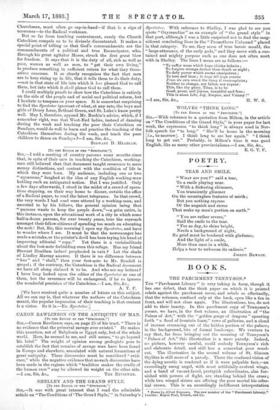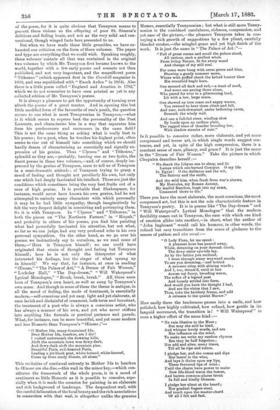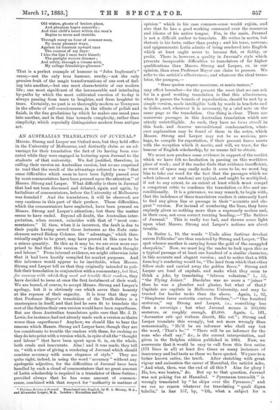BOOKS.
THE PARCHMENT TENNYSON.*
THE "Parchment Library" is very taking in form, though it has one defect, that the thick paper on which it is printed rebels against the parchment cover, and rebels so effectually, that the volumes, confined only at the back, open like a fan. in front, and will not close again. The illustrations, too, do not add to their beauty. In this parchment copy of Tennyson's poems, we have, in the first volume, an illustration of "the Palace of Art," with the "golden gorge of dragons" spouting forth "a flood of fountain foam," rows of galleries, and a cloud of incense streaming out of the hidden portion of the palace; in the background, bits of formal landscape. We venture to say that, far from bringing out the meaning of Tennyson's "Palace of Art," this illustration is a mere parody. Indeed, no picture, however careful, could embody Tennyson's rich and elaborate detail, and still less a somewhat poor wood- cut. The illustration in the second volume of St. Simeon Stylites is still more of a parody.. There the confused vision of the dying ascetic is rendered as if it were palpable fact,—an exceedingly smug angel, with most artificially-evolved wings, and a band of vacant-faced, prettyish subordinates, also fur- nished with powers of flight, are standing behind the cross ; while two winged sisters are offering the poor mortal his celes- tial crown. This is an exceedingly indifferent interpretation • Penns by Alfred Tentwoon. The new number of the "Parchment Library.'• London Kegan Paul, Trench, and Co.
of the poem, for it is quite obvious that Tennyson means to present these visions as the offspring of poor St. Simeon's delirious and failing brain, and not as the very solid and con- ventional, though winged facts here presented to us.
But when we have made these little grumbles, we have ex- hausted our criticism on the form of these volumes. The paper and type are everything that we could wish. Speaking roughly, these volumes contain all that was contained in the original two volumes by which Mr. Tennyson first became known to the world, together with a few early poems and sonnets not then published, and not very important, and the magnificent poem
Tithonus " (which appeared first in the (Jornhill magazine in 1860, and was republished with "Enoch Arden" in 1864). Also
there is a little poem called "England and America in 1782," which we do not remember to have seen printed as yet in any collected edition of Mr. Tennyson's poems.
It is always a pleasure to get the opportunity of turning over afresh the poems of a great master. And in opening this but little modified form of the favourite of one's youth, the question occurs to one what is most Tennysonian in Tennyson,—what _is it which seems to express best the personality of the Poet Laureate, and characterise him in a way that separates him from his predecessors and successors in the same field ? This is not the same thing as asking what is really best in his poems ; for a poet, when he touches his highest point, often seems to rise out of himself into something which we should hardly dream of characterising as essentially and signally ex- pressive of his genius. Thus " Ulysses " and Tithonus," splendid as they are,—probably, barring one or two lyrics, the finest poems in these two volumes,—and, of course, deeply im- pressed by the genius of Tennyson, seem to tell us of Tennyson in a semi-dramatic attitude ; of Tennyson trying to grasp a mood of feeling and thought not peculiarly his own, but only one which had deeply fascinated his intellect. Those are just the conditions which sometimes bring the very best fruits out of a man of high genius. It is probable that Shakespeare, for instance, would never have known his own genius, had he not attempted to embody many characters with which personally it may be he had little sympathy, though imaginatively he felt the very deepest delight in conceiving and portraying them. So it is with Tennyson. In " Ulysses " and " Tithonns," in both the pieces on "The Northern Farmer," in 6` Rizpah," and probably in others of his poems, you find him painting what had powerfully fascinated his attention, but not what, so far as we can judge, had any very profound echo in his own personal sympathies. On the other hand, as we go over his poems. we instinctively say to ourselves, as we read some of them,—' Here is Tennyson himself ; no one could have originated that strain of thought and feeling but Tennyson
himself ; here he is not only the interpreter of what interested his feelings, but the singer of what sprang up in himself.' We say that, for instance, at once in reading CEnone," "The Palace of Art," "A Dream of Fair Women,"
" Lacksley Hall," "The Day-dream," "Will Waterproof's Lyrical Monologue," "Break, break, break." All; these seem born of Tennyson's own heart, as well as sung by Tennyson's own muse. And though in some of these the theme is antique, in all the mood of feeling, the mode of treatment, is essentially modern,—self-conscious and yet easy, light and yet elaborate, at once lavish and disdainful of ornament, both terse and luxuriant, the treatment of a poet who is always a conscious artist, who has always a manner of his own, and yet who never stiffens into anything like formula or poetical pretence and parade. What, for instance, can be more beautiful, and yet more modern and less Homeric than Tennyson's " CEnone ;"—
" 0 Mother Ida, many-fonntained Ida,
Dear Mother Ida, hearken, ere I die!
I waited underneath the dawning hills, Aloft the mountain lawn was dewy-dark, And dewy-dark aloft the mountain pine.
Beautiful Paris, evil-hearted Paris, Leading a jet-black goat, white-horned, white-hooved, Came up from reedy Simois, all alone."
This recitative of continual entreaty to Mother Ida to hearken to CEnone ere she dies,—this wail in the minor key,—which con- stitutes the framework of the whole poem, is in a mood of sentiment as little Homeric as it is possible to conceive, espe- cially when it is made the occasion for painting in an elaborate and rich background of landscape. The despondent wail, with the careful delineation of the local beauty and the rich associations in connection with that wail, is altogether unlike the genuine Homer, essentially Tennysonian ; but what is still more Tenny- sonian is the combined carefulness, richness, compression, and yet ease of the picture,—the pleasure Tennyson takes in con- veying a, rich growth of suggestions by a few pliant, carefully- blended strokes,—the mingled grace and yet high finish of the work. It is just the same in "The Palace of Art :"—
" Full of great rooms and small the palace stood, All various, each a perfect whole
From living Nature, fit for every mood And change of my still soul.
For some were hung with arras green and blue, Showing a gaudy summer morn, Where with puffed cheek the belted hunter blew His wreathed bugle horn.
One seemed all dark and red,—a tract of sand, And some one pacing there alone,
Who paced for ever in a glimmering land, Lit with a low, large moon.
One showed an iron coast and angry waves, You seemed to hear them climb and fall, And roar, rock-thwarted, under bellowing caves,.
Beneath the windy wall.
And one a fall-fed river, winding slow By herds upon an endless plain, The ragged rims of thunder brooding low, With shadow streaks of rain."
Is it possible to conceive richer, more elaborate, and yet more compressed and terser art, in which single words suggest sen- tences, and yet, in spite of the high compression, there is a constant sense of ease, pliancy, and grace ? It is just the same- in the "Dream of Fair Women." Take the picture in which.
Cleopatra describes herself :—
" We drank the Libyan sun to sleep, and lit
Lamps which out-burned Canopus. 0 my life In Egypt ! 0 the dalliance and the wit, The flattery and the strife, And the wild kiss, when fresh from war's alarms, My Hercules, my Roman Antony, My mailed Bacchus, leapt into my arms, Contented there to die."
There you have the most elaborate, the most conscious, the most: compressed art, but this is not the sole characteristic feature in, Tennyson's poetry. It is in poems like "The Day-dream" and "Will Waterproofs Lyrical Monologue" that the modem flexibility comes out in Tennyson, the ease with which one kind, of emotion glides into another,—in short, what the author of "John Inglesant" would call his humour, in other words, the- refined but easy transitions from the sense of gladness to the- senses of pathos, and vice versa' :— "0 Lady Flora, let me speak :
A pleasant hour has passed away, While, dreaming on your damask cheek, The dewy sister eye-lids lay.
As by the lattice you reclined, I went through many wayward moods To see you dreaming,—and behind A summer crisp with shining woods ; And I, too, dream'd, until at last Across my fancy, brooding warm, The reflex of a legend past And loosely settled into form.
And would you have the thought I-had, And see the vision that I saw,
Then, take the broidery frame, and add A crimson to the quaint Macaw."
How easily there the tenderness passes into a smile, and how- polished, how highly cultivated, how refined, how gentle in its languid movement, the transition is ! "Will Waterproof" in
even a higher effort of the same kind :—
"No vain libation to the Muse ;
But may she still be kind, And whisper lovely words, and use Her influence on the mind, To make me write my random rhymes Ere they be half forgotten ; Nor add and alter, many times, Till all be ripe and rotten.
I pledge her, and she comes and dips Her laurel in the wine, And lays it thrice upon my lips, These favoured lips of mine ; Until the charm have power to make' New life-blood warm the bosom, And barren common-places break In full and kindly blossom.
I pledge her silent at the board ; Her gradual fingers steal, And touch upon the master-chord Of all I felt and feel. Old wishes, ghosts of broken plans, And phantom hopes assemble ; And that child's heart within the man's Begins to move and tremble.
Through many an hoar of summer suns, By many pleasant ways, Against its fountain upward runs The current of my days : I kiss the lips I once have kissed; The gaslight wavers dimmer ; And softly, through a vinous mist, My college friendships glimmer."
That is a perfect example of humour in "John Inglesant's " sense,—not the only true humour, surely,—not the only genuine fruit of the magic transformations of one sort of feel- ing into another,—but one most characteristic of our modern life ; one most significant of the innumerable and interlacing by-paths by which the most cultivated emotion of to-day is always passing from tears to laughter, and from laughter to tears. Certainly, no poet is so thoroughly modern as Tennyson in the effects of self-consciousness, in the effects of polish and finish, in the fine gradations by which he makes one mood pass into another, and in that bias towards complexity, rather than simplicity, which especially distinguishes modern from antique art.




































 Previous page
Previous page